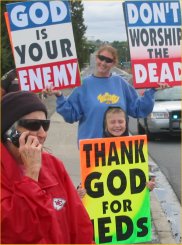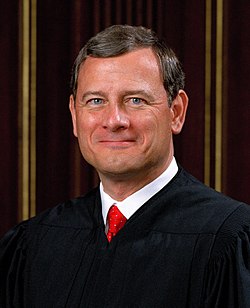| Snyder v. Phelps | |
|---|---|
 | |
| Argued October 6, 2010 Decided March 2, 2011 | |
| Full case name | Albert Snyder v. Fred W. Phelps Sr.; Westboro Baptist Church, Incorporated; Rebekah A. Phelps-Davis; Shirley L. Phelps-Roper |
| Docket no. | 09-751 |
| Citations | 562 U.S. 443 ( more ) 131 S. Ct. 1207; 179 L. Ed. 2d 172; 2011 U.S. LEXIS 1903; 79 U.S.L.W. 4135; 39 Media L. Rep. 1353; 22 Fla. L. Weekly Fed. S 836 |
| Argument | Oral argument |
| Opinion announcement | Opinion announcement |
| Case history | |
| Prior | Judgment for the plaintiff, 533 F. Supp. 2d 567 (D. Md. 2008); reversed, 580 F.3d 206 (4th Cir. 2009); cert. granted, 559 U.S. 990(2010). |
| Questions presented | |
| Whether Hustler Magazine v. Falwell applies to a private person versus another private person concerning a private matter, and whether a funeral attendee is considered a "captive audience" entitled to state protection from unwanted communication. | |
| Holding | |
| Speech on a matter of public concern, in a public place, cannot be the basis of liability for a tort of emotional distress. | |
| Court membership | |
| |
| Case opinions | |
| Majority | Roberts, joined by Scalia, Kennedy, Thomas, Ginsburg, Breyer, Sotomayor, Kagan |
| Concurrence | Breyer |
| Dissent | Alito |
| Laws applied | |
| U.S. Const. amend. I | |
Snyder v. Phelps, 562 U.S. 443 (2011), is a landmark decision by the Supreme Court of the United States in which the Court held that speech made in a public place on a matter of public concern cannot be the basis of liability for a tort of emotional distress, even if the speech is viewed as offensive or outrageous.
Contents
- Background
- Prior case law
- Facts of the case
- Lower court proceedings
- Supreme Court
- Opinion of the Court
- Alito's dissent
- See also
- Footnotes
- References
- External links
On March 10, 2006, seven members of the Westboro Baptist Church (WBC), led by the church's founder Fred Phelps, picketed the funeral of U.S. Marine Matthew Snyder, who was killed in a non-combat accident during the Iraq War. On public land about 1,000 feet from where the funeral was being held, protesters displayed placards that read "Thank God for Dead Soldiers", "God Hates Fags", and "You're Going to Hell", among others. Snyder's father, Albert Snyder, filed a lawsuit seeking damages from Phelps and the Westboro Baptist Church, claiming that their picketing was meant to intentionally inflict emotional distress. Phelps defended the picketing as an appropriate use of their right to free speech and right to peacefully protest as protected by the First Amendment to the U.S. Constitution.
The District Court of Maryland ruled in Snyder's favor and awarded him a total of $10.9 million in damages, but the Fourth Circuit Court of Appeals reversed, holding that the protesters' signs were "rhetorical hyperbole" and "figurative expression" and were therefore protected speech under the First Amendment. On appeal to the U.S. Supreme Court, the Court ruled in favor of Phelps, holding that speech made in a public place on a matter of public concern cannot be the basis for a claim of tort liability for intentional infliction of emotional distress. In an 8–1 decision delivered by Chief Justice John Roberts, the Court wrote that the First Amendment "shield[s] Westboro from tort liability for its picketing" because the speech was made on a matter of public concern and did not disrupt the funeral. The First Amendment provides special protection to public issues because it serves "the principle that debate on public issues should be uninhibited, robust, and wide-open." [1]


